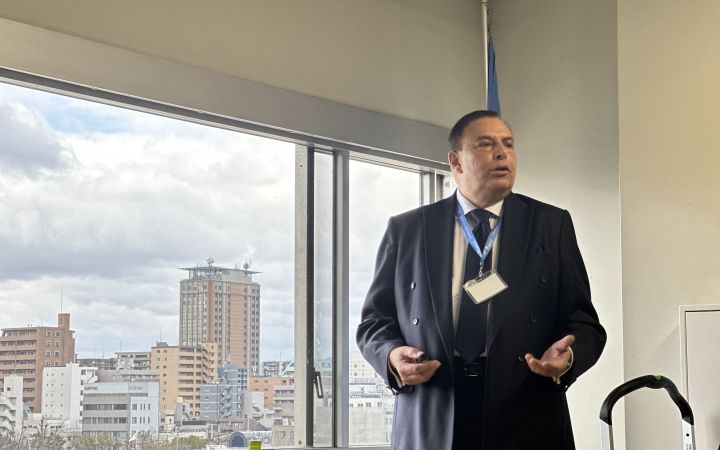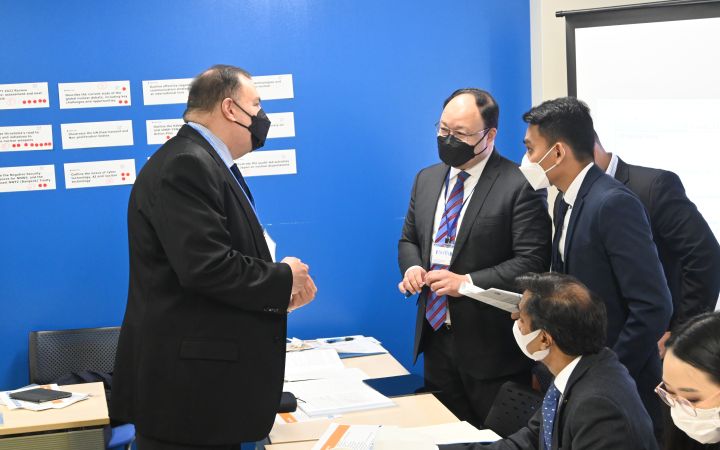- Tariq Rauf is an expert trainer for the UNITAR's Nuclear Disarmament and Non-Proliferation Training Programme.
- He is the former Head of Nuclear Verification and Security Policy Coordination at the International Atomic Energy Agency (IAEA) with years of experience in nuclear disarmament, non-proliferation, and arms control.
- The UNITAR nuclear disarmament training brings diplomats to Hiroshima, where they can stand at ground zero and see the bare memorial dome.
- Tariq believes the UNITAR programme fills a critical gap for developing countries in Asia, building their capacity to help build a safer world.
24 May 2023, Hiroshima, Japan - Tariq Rauf, former Head of Nuclear Verification and Security Policy Coordination at the International Atomic Energy Agency, trains diplomats from Asian countries to negotiate effectively for nuclear disarmament and non-proliferation. Since 2015, he has been a key resource person for UNITAR Hiroshima's Nuclear Disarmament and Non-Proliferation Training Programme.
Tariq has a wealth of experience and a deep commitment to nuclear disarmament, non-proliferation and arms control. At the IAEA, he took part in developing mechanisms to ensure compliance with international nuclear safeguards and verification agreements. He also handled inspections, verification activities, and reporting on the nuclear programmes of various countries.
Missing: The human face of nuclear destruction
Tariq finds that discussions around nuclear weapons ignore the humanitarian implications of nuclear warfare.
Unfortunately, our discussions at the diplomatic and academic levels on nuclear weapons issues have become very direct. We talk about these issues [as if] there were no consequences to producing nuclear weapons.
But those implications are at the heart of why a world without nuclear weapons is essential. This is where Tariq sees the particular value of the UNITAR Hiroshima NDNP programme, which brings diplomats to Hiroshima.
In Hiroshima, not only do the diplomats learn the theoretical components of nuclear disarmament; they experience standing at ground zero and seeing the bent steel rafters of the memorial dome. They meet the survivors, hibakusha, and hear first-hand about the consequences of a single nuclear weapon.
Tariq believes the UNITAR programme is invaluable because it reinforces the diplomats' commitment to nuclear disarmament and non-proliferation while letting them practice their negotiation skills to act on their commitment.
Not all countries have sufficient resources and information about nuclear issues. Tariq sees UNITAR as filling a critical gap for those countries, providing important capacity-building to help build a safer world.
About UNITAR
The United Nations Institute for Training and Research (UNITAR) is a dedicated training arm of the United Nations. In 2021, UNITAR trained 370,139 learners around the world to support their actions for a better future. In addition to our headquarters in Geneva, we have offices in Hiroshima, New York, Bonn and various networks around the world.
One of the eight divisions of UNITAR, the Division for Prosperity, based in the Hiroshima Office and Geneva Headquarters, seeks to shape an inclusive, sustainable and prosperous world. World-class learning and knowledge-sharing services on entrepreneurship, leadership, finance and trade, digital technologies, and nuclear disarmament and non-proliferation are offered. We empower individuals from developing countries - especially women and young people - to address inequalities. Our alumni are making a difference in least-developed countries, countries emerging from conflict, and small-island developing states.








